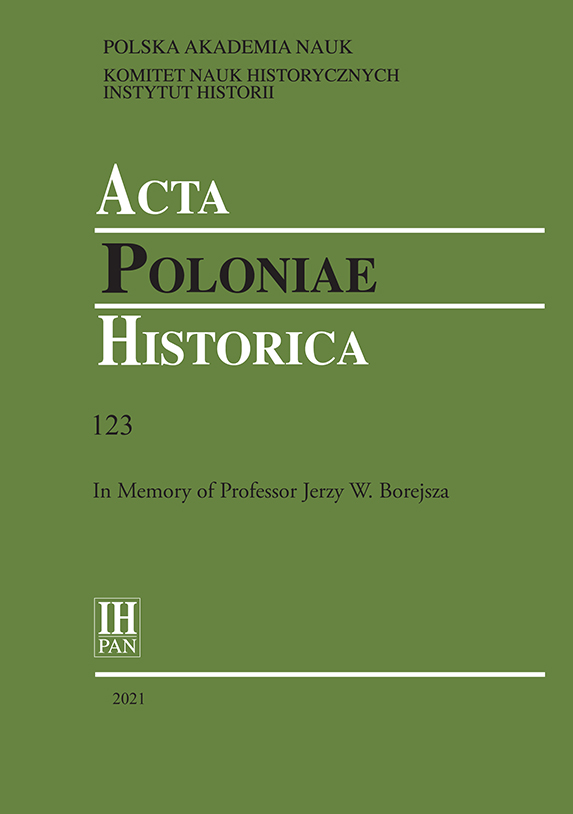The Soviet Narrative of the Warsaw Ghetto Uprising
DOI:
https://doi.org/10.12775/APH.2021.123.11Słowa kluczowe
Holocaust memorialisation, Holocaust instrumentalisation, Soviet press, Jewish Anti-Fascist Committee, Sovetish HeymlandAbstrakt
Soviet ideological overseers did not consider the Warsaw Ghetto uprising an utterly taboo topic. However, on their general scale of notable events of the Second World War, the uprising belonged to the category of relatively minor episodes, worth mentioning mainly in the context of ‘more important’ themes, such as the presence of former Nazis in state institutions of West Germany or the collaboration of some Jews, most notably Zionists, with the Nazis. At the same time, the Soviet Yiddish periodicals, first Eynikayt [Unity, 1942–8] and then Sovetish Heymland [Soviet Homeland, 1961–91] did not treat the uprising as an event of secondary importance. Instead, they emphasise the heroism of the ghetto fighters.
Bibliografia
Altshuler Mordechai, ‘The Holocaust in the Soviet Mass Media during the War and in the First Postwar Years Re-examined’, Yad Vashem Studies, xxxix, 2 (2011), 121–68.
Чарный Семен, ‘Советский государственный антисемитизм в цензуре начала 60-х годов (на примере судьбы книrи Б. Марка “Восстание в Варшавском гетто”)’, Вестник Еврейского Университета в Москве, xv, 2 (1997), 76–81.
Estraikh Gennady, ‘Anti-Nazi Rebellion in Peretz Markish’s Drama and Prose’, in Joseph Sherman et al. (eds), A Captive of the Down: The Life and Work of Peretz Markish (Oxford, 2011), 172–85.
Эстрайх Геннадий, Еврейская литературная жизнь Москвы, 1917–1991 (Санкт-Петербург, 2015).
Gershenson Olga, The Phantom Holocaust: Soviet Cinema and Jewish Catastrophe (New Brunswick, 2013).
Mark Ber[nard], Der oyfshtand in varshever geto (Varshe, 1963).
Mark Bernard, ‘Dziennik’, ed. and transl. by Joanna Nalewajko-Kulikov, Kwartalnik Historii Żydów, 2 (2008), 156–92.
Nalewajko-Kulikov Joanna, ‘Three Colours: Grey. Study for a Portrait of Bernard Mark’, Holocaust Studies and Materials: Journal of the Polish Center for Holocaust Research (2010), 206–26.
Redlich Shimon, Kiril M. Anderson, and Ilia Altman, War, Holocaust and Stalinism: A Documented Study of the Jewish Anti-Fascist Committee in the USSR (Luxembourg, 1995).
Smolar Hersh, Oyf der letster pozitsye mit der letster hofenung (Tel-Aviv, 1982).
Thompson Ewa M., ‘The Katyn Massacre and the Warsaw Ghetto Uprising in the Soviet-Nazi Propaganda War’, in John and Carol Garrard (eds), World War 2 and the Soviet People (New York, 1993), 213–32.
Vergelis Aron, Rayzes (Moskve, 1976).
Волохова Юлия А., ‘Забытое свидетельство из освобожденной Варшавы’, Вопросы литературы, 2 (2020), 13–27.
Zeltser Arkadi, ‘How the Jewish Intelligentsia Created the Jewishness of the Jewish Hero: The Soviet Yiddish Press’, in Harriet Murav and Gennady Estraikh (eds), Soviet Jews in World War II: Fighting, Witnessing, Remembering (Brighton, 2014), 104–28.
Pobrania
Opublikowane
Jak cytować
Numer
Dział
Licencja
Title, logo and layout of journal are reserved trademarks of APH.Statystyki
Liczba wyświetleń i pobrań: 414
Liczba cytowań: 0



